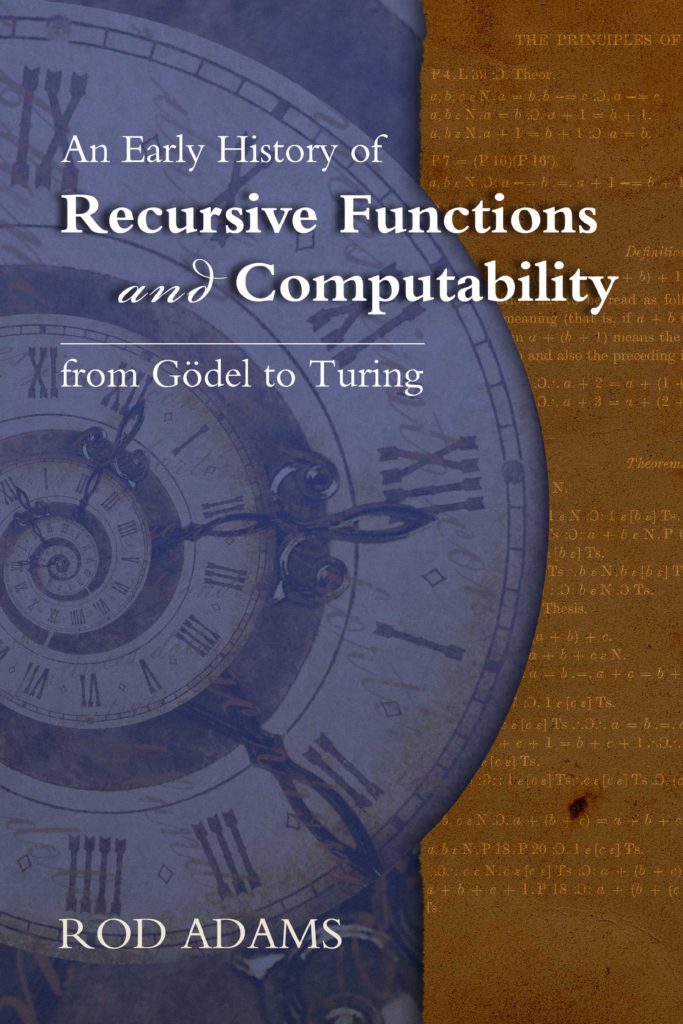| Chapter 1 |
Early Recursive Definitions |
|
Introduction |
|
The First Recursive Definitions |
|
Mathematical Thought at the Turn of the Nineteenth Century |
|
Mathematical Truth and Consistency |
|
The Paradoxes of the Infinite |
|
Concluding Remarks |
| Chapter 2 |
Skolem’s Contribution |
|
Introduction |
|
The 1923 Paper |
|
Comments and Conclusion |
| Chapter 3 |
Hilbert’s Program and Gödel’s Incompleteness Theorems |
|
Introduction |
|
Hilbert’s Approach |
|
Hilbert’s Foundational Papers |
|
Results on Recursive Function Theory |
|
Scope of the Functions |
|
Transfinite Recursion |
|
General Schema for Ordinary Recursion |
|
Extension of Ordinary Recursion |
|
The Fate of Hilbert’s Plan |
|
Gödel’s 1931 Paper |
|
Comments and Conclusion |
| Chapter 4 |
Early Work Leading to λ-Definable Functions |
|
Introduction |
|
Church’s System of Logic |
|
The Development of Church’s System |
|
A Theory of Positive Integers in Formal Logic |
|
λ-Definable Functions |
|
Decision Problems |
|
Conclusion – The Inconsistency of Church’s Logic |
| Chapter 5 |
General Recursive Functions |
|
Introduction |
|
The Development of Ordinary Recursive Functions |
|
General Recursive Functions |
|
Kleene’s Normal Form for General Recursive Functions |
|
The First Definition |
|
An Example of the First Definition |
|
The Second Definition |
|
Other Developments |
|
Conclusion |
| Chapter 6 |
Church’s Thesis |
|
Introduction |
|
λ-Definable vs. General Recursive |
|
The Equivalence Theorem |
|
Some Extended Equivalence Results |
|
Church’s Thesis |
|
The Heuristic Evidence |
|
The Equivalence of Various Diverse Formulations |
|
Turing’s Computable Functions |
|
Church’s Formulations |
|
Reaction to Church’s Thesis |
|
Recursive Unsolvability |
|
Constructivity and Conclusion |
| Chapter 7 |
Turing’s Computable Functions |
|
Introduction |
|
Turing’s Machines |
|
Post’s Formulation and Later Devices |
|
Turing’s Thesis |
|
The Non-Existence of Certain Machines |
|
Computable, Recursive and λ-Definable Functions |
|
Conclusion |
| Appendix A |
Dates of Major Figures |
| Appendix B |
Letters |
|
Alonzo Church to Stephen C. Kleene, November 29, 1935 |
|
Stephen C.Kleene to Author, July 28, 1977 |
|
Alonzo Church to Author, April 21, 1978 |
|
Hao Wang to Author, July 16, 1979 |
|
Stephen C.Kleene to Author, July 17, 1979 |
|
Jean van Heijenoort to Author, August 17, 1979 |
|
Stephen C.Kleene to Author, November 3, 1981 |
|
Stephen C.Kleene to Author, November 13, 1981 |
|
J. Barkley Rosser to Author, November 19, 1981 |
|
Stephen C.Kleene to Author, September 9, 1982 |
|
Stephen C.Kleene to Author, April 4, 1983 |
| Bibliography |

